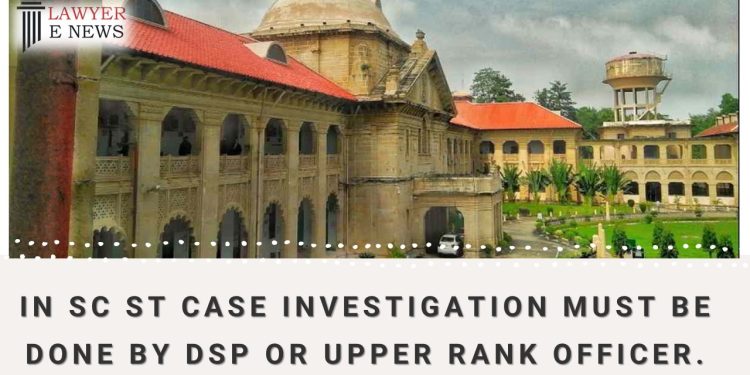In SC ST Case Investigation must be done by DSP or Upper Rank Officer – Allahabad HC

D.D-05.08.2022
The opinion of the justices Ramesh Sinha and Ajai Kumar Srivastava’s panel was that Sections 3(i)(x) and 3(2)(v) of the S.C./S.T. Act do not apply simply because the first informant and the victims were members of the scheduled caste community.
According to Sections 302/34 of the Indian Penal Code and Sections 3(i)(x) of the Scheduled Castes and Scheduled Tribes (Prevention of Atrocities Act), the appellant was found guilty in this case and given a life sentence along with a punishment of Rs. 5,000.
According to Shri Shiv Shankar Singh, the appellants’ attorney, the learned trial court’s conclusion of guilt against the preponderance of the evidence is not tenable.
According to the respondent’s legal representative, the impugned judgement and order are founded on a proper evaluation and interpretation of the prosecution’s evidence. It is a well-reasoned decision in which the court finds no justification for interfering with its ability to use its Section 386 Cr.P.C. powers.
The High Court ruled that it is common law that suspicion—no matter how serious—cannot serve as a substitute for admissible evidence.
The bench found that the appellants did not embarrass the first informant or the injured parties in any public setting by using intimidation and insults based on caste. Therefore, Sections 3(i)(x) and 3(2)(v) of the S.C./S.T. Act do not consider the first informant and the injured individuals to be members of the scheduled caste community to be crimes in themselves. The High Court also stated that “under Rule 7 of the Scheduled Castes and the Scheduled Tribes (Prevention of Atrocities) Rules, 1995, the offence committed under the S.C./S.T. Act shall be investigated by a However, contrary to what is required by Rule 7 of the S.C./S.T. Rules, the current case has been probed by S.I. Sher Bahadur Singh, who does not hold the rank of Deputy Superintendent of Police. The investigation of this matter, insofar as it relates to offences under Sections 3(i)(x) and 3(2)(v) S.C./S.T Act, is vitiated as a result of this as well.
Given the foregoing, the High Court partially granted the appeal.
Ram Sajeevan Yadav
Vs
State of U.P.





